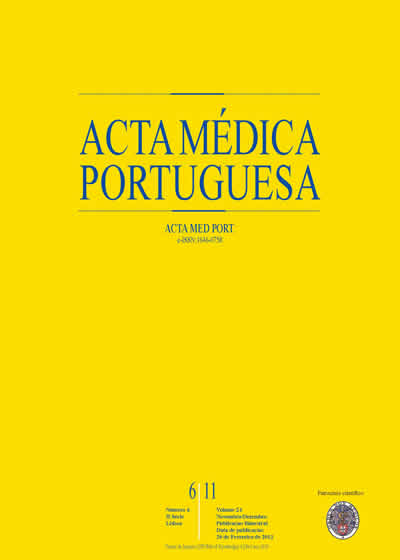Trauma scores na avaliação de politraumatizados: quais e para quê?
DOI:
https://doi.org/10.20344/amp.1421Resumo
The improvement rescue and transport of politrauma patients (PTP) increases the number of patients admitted to the Emergency departments in very severe conditions. The early prediction of later complications and bad outcomes is paramount for a good strategy. The aim of this study was to evaluate the severity of PTP in the Trauma Room (TR) of a Level 1 Hospital, using the ISS, RTS, TRISS scores and define variables associated with bad outcomes, namely ICU admission (ICU), ARDS, MODS and Death.Prospective study with data collection of demographic, clinical, laboratory and imaging parameters of all PTP admitted to the TR. The ISS was calculated by the Abbreviated Injury Scale, RTS and TRISS by Trauma.org site formulas. Statistical analysis was performed in SPSS.278 patients were admitted in TR after Manchester screening during 6 months: 244 (185 men, 59 women) were studied, average age 39,32±19.32 years. Hospital admission- 157 patients (ICU-46, Intermediate Care Unit-29, Surgery Services-82) and 85 discharged. Submitted to Surgery-75. Scores: ISS-13,58±19,32, RTS-7,30±1,01; TRISS-92,42±15,85; Glasgow Coma Score (GCS)-13,00±3,61.Severe complications: ARDS-8%; SIRS-40%; MODS-18%; Death-14%.There is statistical correlation between Surgery Type: ICU and MODS; GCS, ISS, RTS, TRISS: ICU, ARDS, MODS and Death. Multivariate analysis shows that Surgery Type, GCS and TRISS predict ICU admission (ROC-0,884); TRISS predicts ARDS (ROC-0,844); TRISS predicts MODS (ROC-0,876); TRISS and age predicts Death (ROC-0,887).This study confirms scores validity in PTP assessment, as they are able to predict severe complications. TRISS seems to be the best score for prediction of bad outcomes.Downloads
Downloads
Publicado
Como Citar
Edição
Secção
Licença
Todos os artigos publicados na AMP são de acesso aberto e cumprem os requisitos das agências de financiamento ou instituições académicas. Relativamente à utilização por terceiros a AMP rege-se pelos termos da licença Creative Commons ‘Atribuição – Uso Não-Comercial – (CC-BY-NC)’.
É da responsabilidade do autor obter permissão para reproduzir figuras, tabelas, etc., de outras publicações. Após a aceitação de um artigo, os autores serão convidados a preencher uma “Declaração de Responsabilidade Autoral e Partilha de Direitos de Autor “(http://www.actamedicaportuguesa.com/info/AMP-NormasPublicacao.pdf) e a “Declaração de Potenciais Conflitos de Interesse” (http://www.icmje.org/conflicts-of-interest) do ICMJE. Será enviado um e-mail ao autor correspondente, confirmando a receção do manuscrito.
Após a publicação, os autores ficam autorizados a disponibilizar os seus artigos em repositórios das suas instituições de origem, desde que mencionem sempre onde foram publicados e de acordo com a licença Creative Commons









